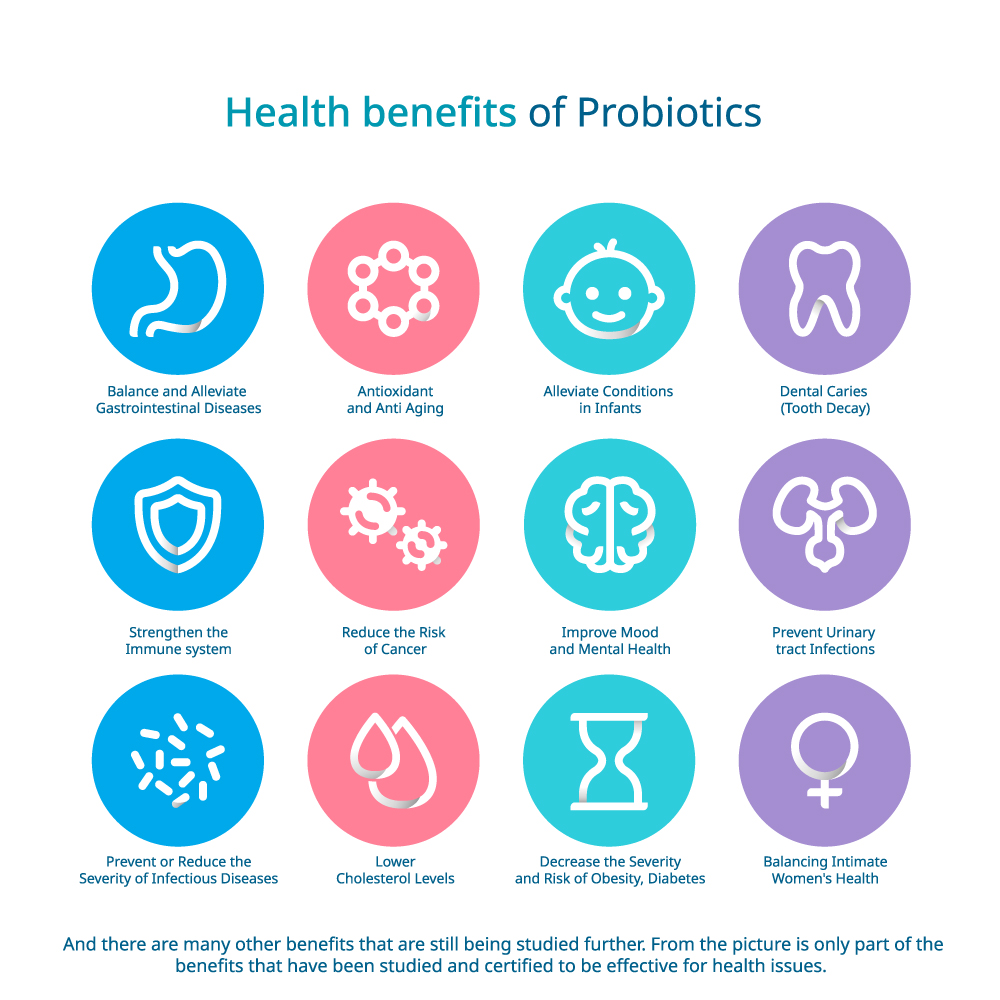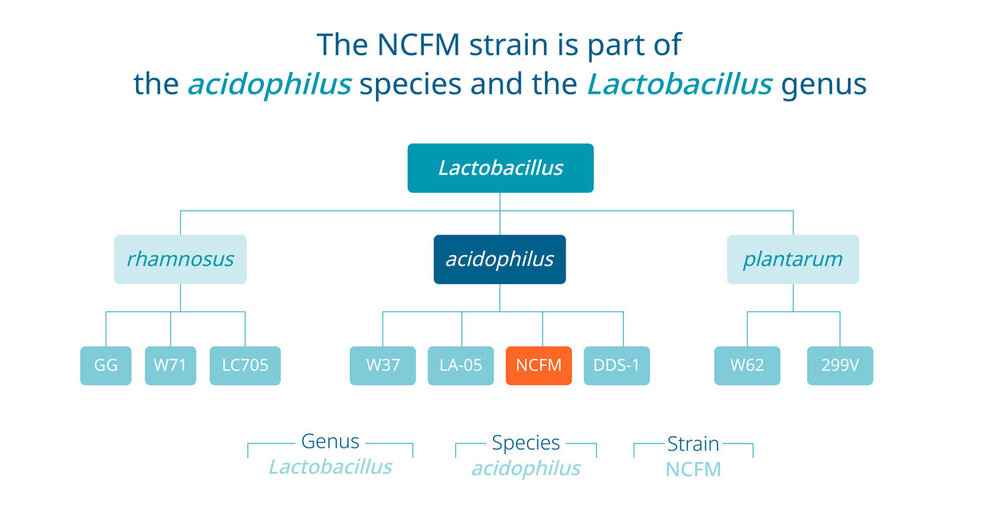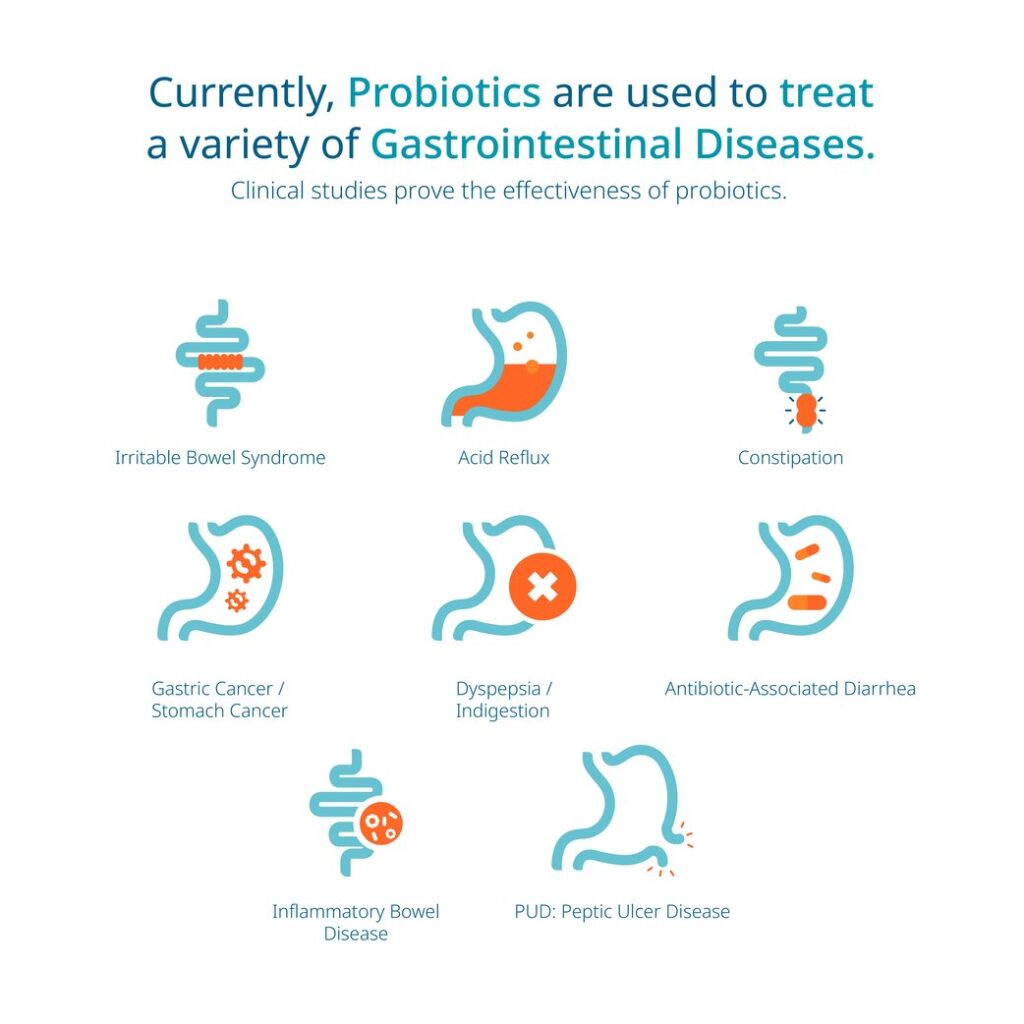Role of Probiotics “Lactobacillus acidophilus” in Human Health
Get to know Probiotics and benefits of “Lactobacillus acidophilus” NCFM microorganisms
Author : Assit. Prof. Pantira Parinyarux, Ph.D.
English translation by Puchita Chokcharoenying

Let’s get to know Probiotics
Probiotics are living microorganisms that are both safe and beneficial for humans in the treatment and prevention of various diseases when consumed in the appropriate amounts. The most frequently employed probiotics microorganisms are bacteria, notably strains like Lactobacillus and Bifidobacterium. Certain fungi and yeasts are also considered probiotics. Probiotics have a long history of use in fermented and traditional foods such as cheese, yogurt, kimchi, apple cider vinegar, fermented fish, soybeans, and milk-based fermented foods, as well as in various preservatives. Over the past two decades, there has also been a noticeable increase in the application of probiotics in the health food, dietary supplement, and nutraceutical industries.1-3
Health benefits of Probiotics
Probiotics play multiple roles within the body, such as modifying the immune response and promoting the growth of beneficial bacteria while inhibiting the growth of harmful infections. Probiotics’ advantages can thus be found throughout the body. While scientific evidence supporting the advantages of certain probiotics is limited, certain strains have shown promising clinical data from in vitro and laboratory studies to validate their effectiveness. 1-3
It is believed that probiotics play a significant role in improving the digestive system and reducing the risk of various gastrointestinal issues like stomach ulcers, acid reflux, indigestion, and gastric cancer, as well as infections of the intestine. They are also assumed to prevent or alleviate the severity of infectious disorders such as acute diarrhea, antibiotic-associated diarrhea, traveler’s diarrhea, and inflammatory bowel disease. Plus, they may also be effective in reducing the severity of irritable bowel syndrome and cholesterol levels. Certain probiotics are known to boost the immune system, particularly during allergy season, and can aid in preventing tooth decay and cystitis. Furthermore, probiotics are widely used to decrease the severity and risk of conditions like obesity, diabetes, and cancer. In present, ongoing research is underway to provide more data to support the use of probiotics in addressing complex diseases and conditions.1-3

Benefits of Lactobacillus acidophilus NCFM strain Probiotics
Among the diverse array of microorganisms categorized as probiotics, it is crucial for consumers to select strains that have solid scientific backing to fully harness the benefits of probiotics. Numerous clinical studies have showcased the efficacy and safety of the L. acidophilus NCFM strain, particularly in its positive impact on the gastrointestinal tract and immune system. Presently, there is compelling evidence suggesting that the consumption of L. acidophilus NCFM strain can lead to improved digestion and enhanced nutrient absorption in the gastrointestinal tract. It is also believed to maintain a balanced level of neurotransmitters in the gastrointestinal tract and exert inhibitory effects on the growth of harmful pathogens, while simultaneously stimulating the body’s immune system.2,4-6

Stimulating the immune system response
Scientific research has verified the efficacy of L. acidophilus NCFM strain in enhancing both environmental protective (IgA) and antigenic (IgM) immunity. In individuals regularly exposed to this probiotics, it improves immune system function and cellular response while reducing the frequency and severity of allergic reactions, allergies, and diseases associated with an overactive immune system.3-7
Preventing or reducing the severity of gastrointestinal disease
The hypothesis suggests that the L. acidophilus NCFM strain possesses anti-inflammatory properties and the capability to produce bacteriocins that hinder the growth of other infections in the digestive system. Research on L. acidophilus NCFM strain has indicated its involvement in protective mechanisms and its potential to alleviate symptoms in gastrointestinal diseases. This is attributed to its ability to enhance the expression of pain-related receptors in the intestinal mucosa, leading to a reduction in the frequency of bowel movements. As a result, giving this probiotics to individuals with intestinal dysfunction could help alleviate stomach pain and flatulence. Furthermore, there is current evidence supporting the combined use of L. acidophilus NCFM probiotics with other probiotics, as well as recommendations to complement standard treatments for patients with gastrointestinal disorders, making probiotics an essential and beneficial addition to the overall treatment plan.4,5,7-9
As per the World Gastroenterology Organization (WGO) 2023 recommendations, L. acidophilus NCFM strain has been found to be effective in reducing symptoms of idiopathic constipation, antibiotic-associated diarrhea, irritable bowel syndrome, and acute diarrhea. Moreover, L. acidophilus NCFM strain has also demonstrated protective effects against Clostridium difficile-associated diarrhea and surgical complications (Table 1).
Table 1 : Examples of World Gastroenterology Organization (WGO)-recommended Probiotics usage in digestive tract disorders

Academic evidence supporting the use of Probiotics, Lactobacillus acidophilus NCFM Strain Stimulating the immune system response
In a study conducted by Paineau D and colleagues, they investigated the humoral immune responses in healthy participants aged 18-65 years who already received oral vaccinations at weeks 1 and 2. The participants consumed seven probiotics, including L. acidophilus NCFM strain, twice daily for four weeks, and during this period, the researchers measured the levels of secretory antibodies in blood and saliva. The study revealed that various probiotics had an impact on the body’s immunological response. Notably, continuous intake of L. acidophilus NCFM probiotics significantly increased the levels of both environmental immunity (IgA) and antigenic immunity (IgM) based on statistical analysis. Hence, these findings indicate that regular consumption of probiotics can enhance the body’s immunological response.7
Relief of idiopathic chronic abdominal pain
In a clinical study examining the mechanism of action and effectiveness of L. acidophilus NCFM probiotics in individuals experiencing mild to moderate abdominal pain, participants were given
L. acidophilus NCFM twice daily for a duration of four weeks. To evaluate the efficacy, researchers conducted biopsies to assess the expression of pain-related receptor genes. The study findings revealed that the consumption of L. acidophilus NCFM probiotics led to an enhancement in the expression of pain-related receptors in the intestinal mucosa, (mu-opioid receptor; MOR and cannabinoid receptor 2; CB2). Additionally, the probiotics were associated with a reduction in the frequency of bowel movements. Based on the results, it can be inferred that continuous usage of L. acidophilus NCFM probiotics can lead to decreased flatulence, reduced severity of idiopathic chronic stomach pain, and fewer days of abdominal pain in patients.8
Relieving flatulence in patients with functional intestinal disorders and irritable bowel
syndrome (IBS)
Paineau D and his team conducted a clinical trial to assess the efficacy of L. acidophilus NCFM strain in treating patients suffering from irritable bowel syndrome (IBS), diarrhea, and idiopathic flatulence. The probiotics L. acidophilus NCFM strain was administered orally twice daily for a duration of 8 weeks. Throughout the treatment period, the researchers monitored the treatment outcomes and collected data on symptom improvement related to intestinal function, flatulence, and abdominal discomfort through patient questionnaires (1 = significantly improved, 7 = significantly worsened). The findings indicated a notable and statistically significant decrease in flatulence among patients with symptoms resembling irritable bowel syndrome by the fourth week (score 4.10 ±3), and this improvement continued through the eighth week. Furthermore, the extended consumption of L. acidophilus NCFM strain for eight weeks led to improvements in other gastrointestinal symptoms and the overall quality of life for the patients. These results align with a study conducted by Lyra A and her colleagues, which found that continuous intake of L. acidophilus NCFM strain for a duration of 12 weeks led to a reduction in the severity scores of irritable bowel syndrome, especially in individuals experiencing moderate to severe stomach pain. The overall study demonstrated that patients’ quality of life scores improved, and there was a statistically significant decrease in pain after the consumption of probiotics.5

Guidelines for the selection of Probiotics microorganisms2
1. Search for and recognize your specific requirements or health issues.
2. Select probiotics products of the appropriate type and strain that meet your individual needs and assist in your health concerns.
3. Opt for products from reputable suppliers to ensure that you are getting a high-quality product.
4. Select products that contain an adequate microbial content and adhere to the recommended dosage stated by the product (at least 5×109 CFU/day).
5. Select products that offer reasonable pricing and can be taken continuously to sustain optimal levels of beneficial microorganisms in your body.
6. Follow the manufacturer’s storage instructions precisely to prevent microbial degradation, especially when storing the product in high temperatures.

Reference
- Bodke H, Jogdand S. Role of Probiotics in Human Health. Cureus. Nov 2022;14(11):e31313. doi:10.7759/cureus.31313
- กิติยศ ยศสมบัติ . Clinical case in community pharmacy: probiotics. วารสารสมาคมเภสัชกรรมชุมชน. 2020;19(110):8-12.
- Yadav MK, Kumari I, Singh B, Sharma KK, Tiwari SK. Probiotics, prebiotics and synbiotics: Safe options for next-generation therapeutics. Appl Microbiol Biotechnol. Jan 2022;106(2):505-521. doi:10.1007/s00253-021-11646-8
- Sadrin S, Sennoune SR, Gout B, et al. Lactobacillus acidophilus versus placebo in the symptomatic treatment of irritable bowel syndrome: the LAPIBSS randomized trial. Cell Mol Biol (Noisy-le-grand). Sep 30 2017;63(9):122-131. doi:10.14715/cmb/2017.63.9.21
- Lyra A, Hillilä M, Huttunen T, et al. Irritable bowel syndrome symptom severity improves equally with probiotic and placebo. World J Gastroenterol. Dec 28 2016;22(48):10631-10642. doi:10.3748/wjg.v22.i48.10631
- Zawistowska-Rojek A, Tyski S. Are Probiotic Really Safe for Humans? Pol J Microbiol. 2018;67(3):251-258. doi:10.21307/pjm-2018-044
- Paineau D, Carcano D, Leyer G, et al. Effects of seven potential probiotic strains on specific immune responses in healthy adults: a double-blind, randomized, controlled trial. FEMS Immunol Med Microbiol. Jun 2008;53(1):107-13. doi:10.1111/j.1574-695X.2008.00413.x
- Ringel-Kulka T, Goldsmith JR, Carroll IM, et al. Lactobacillus acidophilus NCFM affects colonic mucosal opioid receptor expression in patients with functional abdominal pain – a randomised clinical study. Aliment Pharmacol Ther. Jul 2014;40(2):200-7. doi:10.1111/apt.12800
- Ringel-Kulka T, Palsson OS, Maier D, et al. Probiotic bacteria Lactobacillus acidophilus NCFM and Bifidobacterium lactis Bi-07 versus placebo for the symptoms of bloating in patients with functional bowel disorders: a double-blind study. J Clin Gastroenterol. Jul 2011;45(6):518-25. doi:10.1097/MCG.0b013e31820ca4d6
More Probiotics Articles
- Get to know Probiotics the Helpful Microbes : https://www.zenbiohealth.com/get-to-know-probiotics-the-helpful-microbes/
- Probiotics and Immune Enhancement : https://www.zenbiohealth.com/probiotics-and-immune-enhancement-immunity/
- Let’s get to know B. lactis HN019, and its benefits : https://www.zenbiohealth.com/en/b-lactis-hn019/


